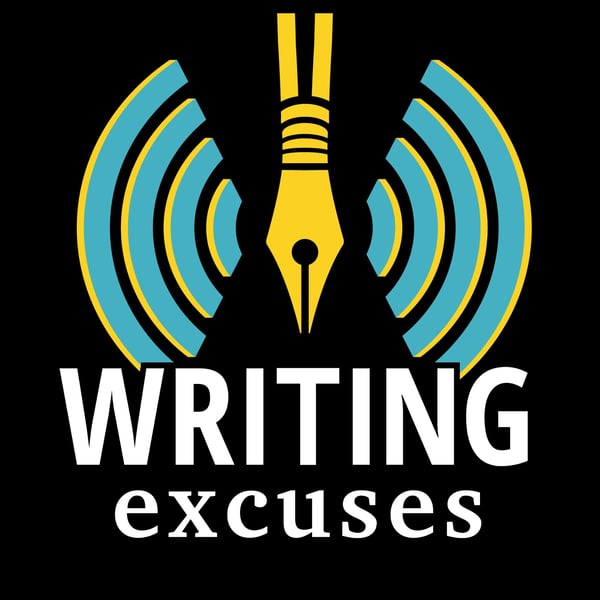20.23: The Lens of the Senses
Writing Excuses
Mary Robinette Kowal, DongWon Song, Erin Roberts, Dan Wells, and Howard Tayler
4.7 • 1.3K Ratings
🗓️ 8 June 2025
⏱️ 29 minutes
🧾️ Download transcript
Summary
How does a room sound? Does your childhood have a taste? What is the smell of summer?
In this episode, we dive into the sensory layers that anchor worldbuilding, character, and perspective. We explore how invoking smell, sound, touch, and taste can transport readers more powerfully than sight alone. What makes a setting feel real and lived in on the page? How do the where and the when hit our reader's and character's senses— and how real is too real?
Thing of the Week: Darkfield
Homework: 5, 4, 3, 2, 1 exercise from C. L. Polk: list five things your character can see, 4 things they can hear, 3 things they can touch, 2 things they can smell, and 1 thing they can taste.
P.S. Our 2025 writing retreat (on a cruise! In mexico!) is over 50% sold out! Learn more and sign up here.
Credits: Your hosts for this episode were Mary Robinette Kowal, DongWon Song, Erin Roberts, and Howard Tayler. It was produced by Emma Reynolds, recorded by Marshall Carr, Jr., and mastered by Alex Jackson.
Join Our Writing Community!
Our Sponsors:
* Check out Kinsta: https://kinsta.com
Support this podcast at — https://redcircle.com/writing-excuses2130/donations
Advertising Inquiries: https://redcircle.com/brands
Privacy & Opt-Out: https://redcircle.com/privacy
Transcript
Click on a timestamp to play from that location
| 0:00.0 | This episode of writing excuses has been brought to you by our listeners, patrons, and friends. |
| 0:05.6 | If you would like to learn how to support this podcast, visit www.com. |
| 0:11.8 | S.W.w.com. Writing excuses. |
| 0:15.3 | Season 20, episode 23. |
| 0:19.5 | This is writing excuses. |
| 0:22.1 | The lens of the senses. |
| 0:23.6 | I'm Mary Robinette. |
| 0:24.7 | I'm Dong Lon. |
| 0:25.5 | I'm Aaron. |
| 0:26.2 | And I'm stinky. |
| 0:28.0 | And we all have a regret. |
| 0:31.6 | So we've been talking about the various lenses you can use to approach how you're doing your world building, how you're building your fiction, how you're just constructing your story in general, right? We've been talking about |
| 0:40.9 | context and time, but I wanted to bring us back down into the body a little bit today. And |
| 0:48.3 | what is the most rooting thing you can do in a scene often is to remind your readers of the sensory details of a |
| 0:56.9 | scene. What do they see? What do they hear? What do they taste? What do they smell? What do they |
| 1:01.3 | feel? Those are the five senses. I believe I hit all of them. And so what do they taste? |
| 1:08.1 | What do they taste? Did I miss that one? Anyways, as we're going through these, or as we're talking about how to make your world feel really lived in, what are the sensor details that you guys reach for in a scene automatically? |
| 1:20.7 | Or what are the ones that you find are the ones that have to remind yourself to include? |
| 1:24.7 | I reach for acoustics very, very quickly because as an audio engineer, one of the first things |
| 1:32.7 | that I would do walking into a space is stop, close my eyes, and listen to the room. |
| 1:39.3 | Not just listening for things that are making noise in the room, but that I'd also, you know, snap my fingers |
| 1:45.0 | or click my tongue and listen for the T60, the time in which an echo will drop to buy 60 decibels. |
... |
Please login to see the full transcript.
Disclaimer: The podcast and artwork embedded on this page are from Mary Robinette Kowal, DongWon Song, Erin Roberts, Dan Wells, and Howard Tayler, and are the property of its owner and not affiliated with or endorsed by Tapesearch.
Generated transcripts are the property of Mary Robinette Kowal, DongWon Song, Erin Roberts, Dan Wells, and Howard Tayler and are distributed freely under the Fair Use doctrine. Transcripts generated by Tapesearch are not guaranteed to be accurate.
Copyright © Tapesearch 2025.

